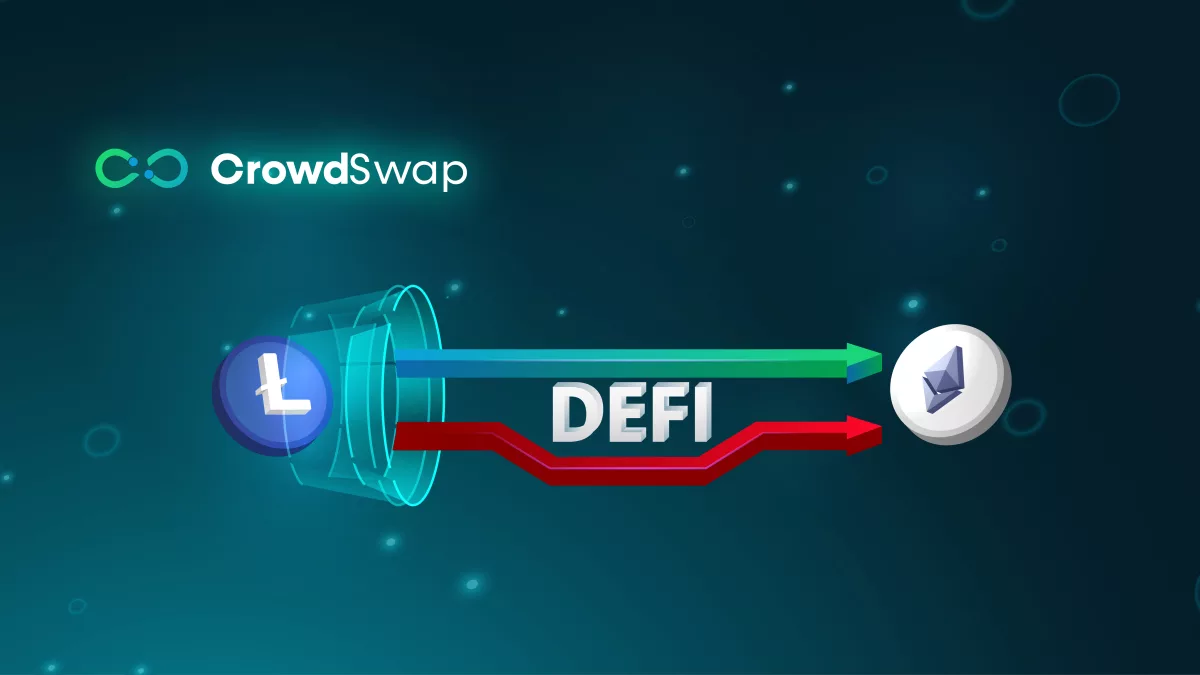Decentralized Finance (DeFi) protocols are ubiquitous, and some, like DEX aggregators, are terrifically attractive tools. Thanks to the aggregation of different decentralized exchange platforms (DEX), these tools allow you to save time and money when exchanging cryptocurrencies. To better understand the issues and the interests and discover the fundamental elements of a DEX aggregator, let’s find out together everything you need to know.
What Are Aggregators in DeFi?
There are types of aggregators in the DeFi ecosystem that serve different purposes. In this part of the article, the most common ones are explained in detail.
Yield Aggregators
Yield aggregators, for example, are tools that help optimize the yields (profits) that investors receive on yield farming protocols. This is done by pooling the funds of various farmers together and using different protocols to maximize profits.
Lending and Borrowing Aggregators
In addition, lending and borrowing aggregators function essentially the same, with the distinction that they facilitate and enhance the lending and borrowing process. Apart from the automation that simplifies the process, such aggregators offer the best options for crypto lenders and borrowers. Using these aggregators, the lender can receive more profit in exchange for lending their funds. On the other hand, the borrower can find the best options that help them pay less interest.
Cross-Chain Aggregators
The third type of aggregator that this article covers is cross-chain aggregators. These protocols go beyond simple aggregation of transactions on a single blockchain network. Instead, they work outside the box and compare options across various blockchains. Simply put, cross-chain aggregators review swap alternatives on different chains to optimize your transactions.
DEX Aggregators
In addition, DEX aggregators are a very commonly-used type in decentralized finance. Behind the term “DEX aggregator,” which may seem complex at first glance, actually hides a relatively simple aggregation tool. This tool will aggregate, that is, retrieve, process, and exploit smart contract data from the various DEX platforms to find the most profitable exchange routes, called best price routing (BPR). It is an intermediary that will develop its own contracts and serve as a relay between you and the protocols that have the liquidity to allow the exchange of cryptocurrencies from and to each other.
How Does a DEX Aggregator Work?
Say you have $1,000 in USDT and want to exchange it for another cryptocurrency. Instead of going to your favorite exchange, you choose to use a DEX aggregator. After entering the data relating to what tokens you want to exchange, it will search among all the platforms it aggregates for the best route to make your exchange. This process takes into account the following criteria:
- Transactions costs
- Slippage
- The price difference between different DEXes
Ultimately, it will show you the route containing the most financially advantageous platforms to make your exchange. Therefore, the aggregator may use one, two, or more platforms simultaneously because it will be the most profitable.
It’s sort of an usher of DeFi by showing you the best route that saves you time and money without the slightest effort on your part. All this is made possible thanks to the blockchain and, more particularly, the smart contracts that can communicate with each other.
Advantages of DeFi Aggregators
Now that we know what aggregators are and how they work, let’s see why they are particularly attractive.
1. Save time
The first advantage of these DeFi tools is that they are time-saving. Rather than searching many DEXes for the best price to carry out your swap, the aggregator does the research on your behalf. The only thing you need to do is determine the cryptocurrencies you want to exchange and the amount. From then on, you will get a summary of the exchanges made in a few seconds. After validating the operation, the exchange will generally occur within a few seconds.
2. Reduce transaction fees
Some DEX aggregators, in addition to working on finding the best price, will optimize the codes of their smart contracts. The more complex functions a contract involves, the more expensive it is to be used. Moreover, the higher the trade amount, the higher the price related to the transaction fees will also be. Optimizing their contracts during these exchanges, these protocols will also allow you to reduce your transaction costs. Therefore, an exchange will theoretically cost you less than using a DEX right away.
3. Getting the best price
A DeFi aggregator, in addition to saving you time, also aims to allow you to buy your tokens at the best price. Indeed, its main objective is to find the most favorable route before exchanging your coins. Based on this principle and depending on the amount of cryptocurrency in your possession, the protocol will use several DEXes to obtain the most profitable option for you.
Best DeFi Aggregators
Aggregators do a vital job in decentralized finance for the reasons discussed above. Many aggregators are active in the crypto market, which makes choosing the best ones hard. Here is the list of the best DeFi aggregators:
CrowdSwap
CrowdSwap is an aggregation protocol in the DeFi space aiming to increase mass adoption for everybody and overcome problems in the fast-growing business DeFi space. In addition to BPR and crosschain swaps, CrowdSwap offers staking and yield farming options for those who want to invest in DeFi. The aggregator concentrates on the following features:
- Providing the best prices for swapping tokens across the DeFi space
- Conducting crosschain swaps
- Suggesting portfolio combination with the highest yields
- Staking and yield farming opportunities
Currently, CrowdSwap supports four blockchain networks: Ethereum, BNB Smart Chain, Polygon, and Avalanche. Moreover, it supports crosschain swaps, which help users exchange tokens across different chains.
1inch
Another best aggregator is 1inch, which has the highest transaction volume in the ecosystem. Available on over a dozen blockchains, such as Ethereum, BNB Smart Chain, and Polygon, it is easy to exchange tokens at the best price, thanks to the aggregation of many decentralized exchange platforms. Its intuitive interface makes it very easy to use and offers features such as limit orders and P2P exchange. 1inch supports exchange on the following chains:
- Ethereum;
- BNB Chain;
- Polygon;
- Arbitrum;
- Optimism;
- Gnosis Chain;
- Avalanche;
- Klaytn;
- Aurora and;
- Fantom
KyberSwap
KyberSwap, formerly known as Dynamic Market Maker (DMM), is a decentralized exchange aggregator launched in 2018. Available on 13 blockchains currently and soon on Solana, it occupies an important place in the ecosystem. In addition to the classic exchange functionalities, KyberSwap has other features like:
- Protocol-specific liquidity pools;
- A farming space to obtain interest in KNC (the governance token of the Kyber Network protocol);
- Trading competition with prizes;
Trade Effortlessly
Ready to dive deeper? Our crypto exchange is simple and user-friendly, making trading a breeze
Wrapping It All Up
DeFi aggregators are utilities that provide many benefits in terms of time and money. Nevertheless, using them should not be done blindly. You should not hesitate to compare prices from time to time on these different aggregators or even directly on certain essential protocols, such as Uniswap, depending on the cryptocurrencies exchanged.








